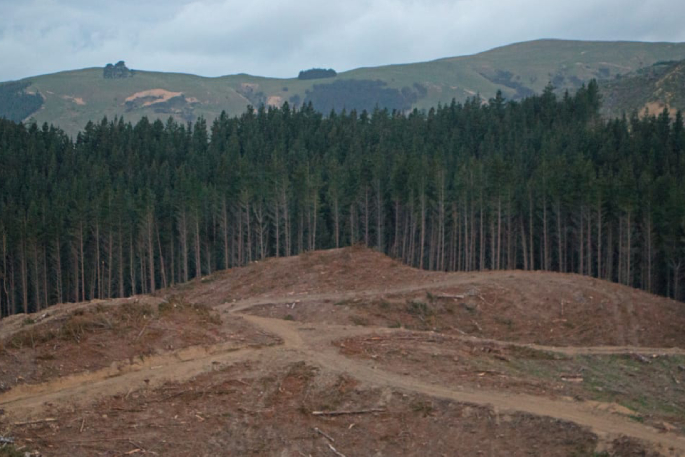The government has been urged to quickly shrink the number of carbon credits available for polluters to buy, after four failed auctions in 2023.
The Climate Change Commission says there are too many credits on offer, the problem is getting worse and it won't fix itself.
It also says the government needs to clarify what its plan is for meeting its climate targets, because uncertainty is affecting investor confidence.
The next carbon auction is on March 20.
The coalition government promised to use emissions pricing - not subsidies - to meet New Zealand's climate goals.
But independent advice from its top climate body, out today, says it doesn't have the settings right to get there and its lack of clarity is undermining the market.
The Climate Change Commission says the market (the Emissions Trading Scheme or ETS) was flooded with too many carbon credits.
These are the units many large polluters must buy when they release planet-heating gases.
The surplus created a "high risk" the country won't meet the emissions budgets written into law, the commission says.
Last year, all four of the government's carbon auctions failed because of low demand for new units.
On the flipside, in a side note, the commission suggests that if the government did tighten supply, it may be able to meet more of New Zealand's international climate target for 2030 inside the country, which would mean buying fewer carbon offsets from overseas, possibly saving the country money.
A spokesman for Climate Change Minister Simon Watts says he couldn't comment on the advice until it had been through a consideration process.
Wider lack of vision highlighted
The report includes specific advice on the ETS settings as well as a side note on wider issues affecting the market.
By December - the date the government's next carbon-cutting plan is due - ministers either need to explain what other policies they will bring in to cut emissions or fix the carbon market, it says.
Otherwise the delay would undermine investor confidence and create "avoidable costs".
The commission advised ongoing uncertainty about the government's plans risked undermining investment in clean growth.
The idea behind the carbon market is that scarce supply drives companies to find ways to cut emissions, helping the country decarbonise.
The National Party campaigned on using the market to drive reductions, rather than using subsidies like EV discounts or grants for companies to replace coal boilers.
But an accompanying note from commission chair Dr Rod Carr to the government says: "There are ongoing gaps in government policy that affect the NZ ETS and create uncertainty for market participants.
"These issues are not the focus of the recommendations in this advice, but we raise them as they undermine the ability of the NZ ETS unit limits and price control settings to serve their purpose.
"If these issues remain unresolved, it will become increasingly difficult to accord the settings with emissions reduction targets in future."
Carr noted the ETS covered less than half New Zealand's emissions (farming, and some export-reliant-polluters are largely excluded) and also allowed unlimited tree planting by carbon farmers, in place of real emissions cuts. The latter is something some in the farming community have protested against.
The advice was the government could shrink the supply of units without changing the price settings.
In a spot of good news, projections by environment officials suggested carbon dioxide and nitrous oxide emissions are likely to fall, however the commission says this will worsen the over-supply of carbon credits if the Government doesn't step in.
"It is critical that the government adjust the NZ ETS unit volume limits as soon as possible to draw the surplus down and bring the settings back into alignment with targets," it says.
Carr also wrote: "The second emissions reduction plan (due December 2024) will need to show, if the current NZ ETS structure is to be maintained, how other policies will make up for the scheme's limitations - or alternatively, outline how the NZ ETS will evolve.
"Delay will undermine the confidence of investors, lead to disappointed expectations, delay action needed to meet targets and impose avoidable costs in the future.
"We urge the government not to delay action to make the tool more capable of delivering the outcomes that the Government seeks - as maintaining the status quo will not create the stability sorely needed by the market."



2 comments
Hmmm
Posted on 13-03-2024 22:30 | By Let's get real
This was how the Greens were going to save the planet...
Just as successful as their other policies.
The Master
Posted on 14-03-2024 12:34 | By Ian Stevenson
There is no global warming?? There is of course climate change, there is and has always been... There are "Climate Alarmists" but that is about it, the rest of the story is fake.
There is no emissions issue, never has been, in the past the earth has had some 10-20x more CO2 in the atmosphere than today, somehow and amazingly life on earth survived, has not fried and so on, in fact life actually thrives with more CO2. The reason is 100% obvious to a pre-schooler.... CO2 is plant food, more CO2 means more plants growing faster means more food etc = obviously better.
Can the entire ETS, green fake agenda and cancel the promise d $30 billion payment to be paid overseas (no idea what or how that got dreamed up fabricated??) to who knows nor actually why?
Leave a Comment
You must be logged in to make a comment.